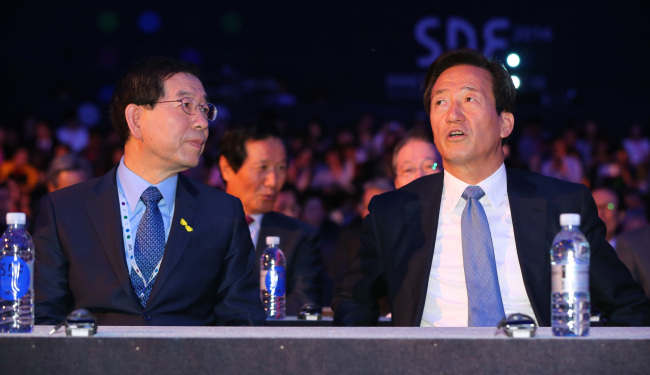This is the first installment in a series of articles on the upcoming local elections, exploring key issues and candidates in major cities. ― Ed.
The Seoul mayoral race is playing out as a battle of opposites with the two main runners representing opposing ideals.
The race has effectively come down to ruling Saenuri Party candidate Chung Mong-joon and main opposition New Politics Alliance for Democracy’s Park Won-soon, who is seeking his second term.
Although Chung took the Saenuri Party primary in a landslide win, he is to face a tougher challenge on June 4.
Not only have his party’s ratings dropped by 5 percentage points since the April 16 ferry disaster, his odds were further undermined by his youngest son.
Following the accident, his youngest son referred to Koreans and Korea as “primitive” on social media, earning widespread criticism. The younger Chung now faces a police investigation.
 |
| Seoul mayoral candidates Park Won-soon (left) and Chung Mong-joon speak at a forum in Seoul on Wednesday. (Yonhap) |
Affected by the developments, Chung is now seen as a long shot with some surveys placing him as far as 20 percentage points behind Park. Before the ferry incident, Chung was closely behind Park.
Other than hoping to become the Seoul mayor, the two share little in common. Even their military service, mandatory for all able-bodied men, are at opposite ends of the spectrum. While Chung served as an officer, Park served as supplementary military personnel, needing to serve only six months.
Chung is a member of the “Hyundai dynasty” that stems from Hyundai Group founder Chung Ju-yung. Although the group was divided among his siblings, Chung remains one of Korea’s richest men.
With assets of more than 2 trillion won ($1.95 billion) Chung is by far Korea’s richest politician. Park, in contrast, is the poorest of the candidates for the leadership of one of the 17 metropolitan and provincial governments.
Due to his family background, Chung has often been criticized for being out of touch with the common people. Despite Chung’s best efforts to prove otherwise, he has been unable to shake off the criticism while making odd comments such as those regarding Seoul bus fares. In 2008, Chung guessed bus fares to be about 70 won, when the actual figures stood at over 10 times the amount.
Park, in contrast, has been accused of being a leftist, an unforgivable crime in the eyes of many older Koreans.
Chung also dwarfs Park in terms of political experience. After entering politics in the late 1980s, Chung served seven terms in the National Assembly, during which time he made an attempt for presidency twice and served as the conservative party’s chairman.
In contrast, Park entered the public eye recently having been raised as Seoul’s chief administrator from relative obscurity in the 2011 Seoul mayor by-election.
Like their backgrounds, their policies also contrast.
Chung’s economic plans include easing urban development regulations to kick-start stalled projects. Park, for his part, hopes to revitalize areas in redevelopment through a more gradual process. Park’s plans, which he introduced during his first term in office, include promoting the development of local communities and job creation within them.
Chung and Park, however, do have one crucial similarity: They are both considered potential presidential candidates.
Although both Chung and Park have stated that they will not resign from the Seoul mayor post before the four-year term ends, they are already seeing support for presidential bids.
In a recent survey, Chung received 15.9 percent support as a potential presidential candidate while the figure for Park came in at 12.1 percent. In comparison, former presidential runners Reps. Ahn Cheol-soo and Moon Jae-in were picked respectively by 15.4 percent and 15 percent of the respondents.
By Choi He-suk (cheesuk@heraldcorp.com)

